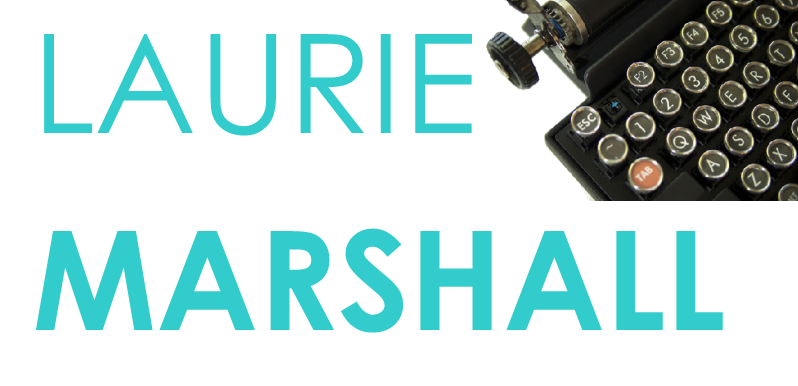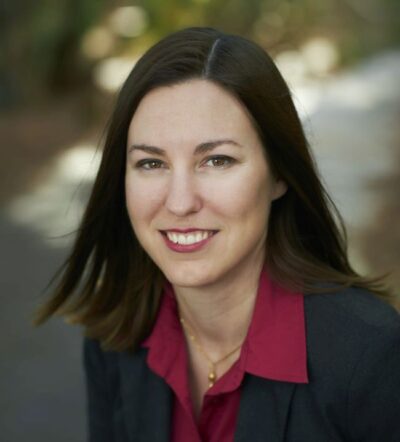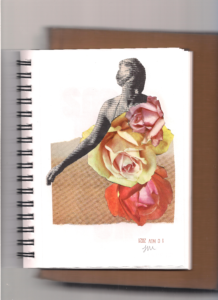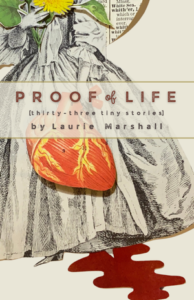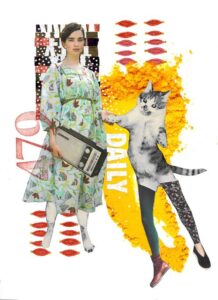This week has started off with a bang on my favorite social media platform, Twitter. I won’t bore you with my opinion about a kajillionaire who could literally solve global problems but chooses instead to piddle around with his own brand of “free speech” while simultaneously blocking people on that platform who disagree with him. None of you want to hear about that.
What I will say is that Twitter remains my favorite platform because it is where I have met dozens and dozens of amazing writers (and humans) like Raegen Pietrucha. In a virtual sea of unnecessary rudeness, Raegen is a kind, supportive friend who consistently shows up as a happy place on my timeline. We “met” when we were both involved in the poetry collection I mentioned in my last post and it’s been such a treat to get to know her. I would say she’s a “cheerleader”, but as a goth girl masquerading as a mature adult she may not appreciate that comparison. Don’t want to offend the goth girls!
Raegen is a recipient of an Academy of American Poets Prize, and has been nominated for the Pushcart Prize and Best of the Net. She has been writing professionally for many years, and has an MFA from Bowling Green State University, so in that way she is a little different than some of us for whom writing is our “second act”. But I think you’ll find that her advice for writers thinking about pursuing an MFA is a rich addition to that ongoing discourse. She is a poet (and we all know poets are very closely related to magical beings) and she made the switch from milk to dark chocolate, a move I fully endorse. So obviously, she’s writer to follow. As always, thanks for reading!
Q&A with Raegen Pietrucha
You’ve been a magazine editor-in-chief and have written articles, fiction, nonfiction, and an award-winning poetry chapbook. Now your full-length poetry collection, “Head of a Gorgon” is coming out from Vegetarian Alcoholic Press in May. Congratulations! What kind of writer ARE you?
Thanks for the kind words! You know, I think because I’ve done so many types of writing and editing at this point, I just think of myself as a person who writes and edits, among other things. Creatively, I started out in fiction, but my chapbook and debut full-length collection are both poetry, and I have a memoir in progress. And since my late 20s, I’ve been writing and editing articles for professional publications. And I just had my first photography submissions published in literary journals this year. So what does that make me? What does it all mean or add up to? Besides a lot of different kinds of creation, who knows?
What is it about poetry that captures your attention? What makes the form the right form for your words?
Poetry isn’t always the right form for the stories I want to tell. For “Head of a Gorgon,” though, it absolutely was. What made that the case, I think, was the fact that what this book became — an exploration of the experience and aftermath of sexual violence through the lens of myth, in both traditional and personal senses — allowed me to bridge important gaps between fiction and nonfiction in a way that felt natural, seamless, and protective. Poetry can be both and neither of those things — fiction and nonfiction — at the same time. Additionally, the condensed nature of poetry — the ability to pack a lot of story, said and unsaid, into a small space — felt right for the subject matter as well, mainly because of the sensitivity around and triggering nature of it. Plus, there are a lot of formal elements to poetry that fascinate me and really can’t be replicated in any other form but also create additional layers of meaning with respect to this subject matter as well as others.
How long did it take to write “Head of a Gorgon”? How did your past writing experience set you up for success as you worked on this collection? Are you more disciplined? More forgiving of those “off” days? Better-quality coffee and chocolate?
I began working on “Head of a Gorgon” in 2007, and it took more than 11 years — with entire years in there where I didn’t work on it at all, for various reasons — to get it to the point where I felt it was ready to start submitting. It evolved a bit during the time I was submitting it as well; two poems got added in that time frame, among other things. My past writing experience allowed me to feel at peace with whatever time the project and I needed to develop; I know that’s not the case for everyone, in that some people get down about taking a long time to complete and publish a project. But that just isn’t me.
That being said, because I took my time with this project — for reasons within and out of my control — I told myself that now that I’ve got this one under my belt, I would like to see if it might be possible to translate what I learned from that process to focus more intently on my next book, the memoir. Maybe it’ll still take a decade-plus to knock this one out as well, and that’s OK, but I promised myself that once I got cranking on the memoir — which I did in 2020 — I was going to do my best to keep cranking, with the exception of this time period from roughly October 2021 through roughly June 2022 wherein I am focusing my time outside of work primarily on PR/marketing efforts to promote “Head of a Gorgon.”
So once this publicity cycle is over, which I truly hope will be well before the end of this year, it’s back to the memoir until that’s done, with any luck. But I’m old enough to know life happens, and sometimes such aspirations aren’t possible due to circumstances beyond my control. And in the event that were to become the case at some point down the line, I know better than to fret or beat myself up about it. There’s just a part of me that wants to be done with these two big stories I have to share from my life. Anything that happens after that or along the way is just extra. But these two stories — “Head of a Gorgon” and my memoir in progress (with a title in progress as well) — I very much feel are ones I need to get out of me and into the universe before I die. Pardon the goth sentiment there, but it’s true.
There probably aren’t many people who give much thought to Medusa after the unit on mythology they took in middle school, but you created a whole narrative about her for your collection. Where do you most often find inspiration for your poetry?
Hey, anyone who got a lesson on Medusa and/or mythology in middle school is luckier than most! I don’t know that this really happens for everyone, at least not anymore. In any case, for me, it’s less about where I find inspiration for a particular form of writing and more about where I find inspiration to create from in general. And for me, most of my creative writing is inspired, for better or worse, by pivotal moments in my life that ultimately became crossroads/turning points. I am most interested in stories of women, like me, who have endured and who have overcome, whatever the trauma or challenge may have been, and that’s what I feel most compelled to write about. We need more stories of women overcoming, of heroes who look and sound like us — who are us. And Medusa most definitely fits this bill.
How are you feeling as a writer in your forties? What’s changed? What’s stayed the same? What are you looking forward to?
Honestly, there’s never been a better time in my life. Perhaps what I’m about to say will be misinterpreted — although it’s not my intention, there’s always the possibility that something like this will be taken personally or as an insult by someone reading this — but there’s a part of me that worries and even feels kind of bad, in that way we feel bad for the friends we had as teenagers who peaked in high school, when success comes too early and maybe even too easily in any creative’s life. And while “too early” doesn’t necessarily equate to a physical age, emotional intelligence and maturity are sometimes tied to physical maturity and aging, and that’s what I’m referring to with that statement.
Although I’ve never been thin-skinned, I was also not thick-skinned or emotionally mature enough in my 20s to cope healthily with some of the things that have happened as I’ve prepared to publish this book, so this is really an assessment of myself reflecting on the younger me and just being grateful that I’m right where I need to be now, at this age, to deflect the slings and arrows, anticipated or otherwise, that have flown my way during this part of my life’s journey. And I’m looking forward to being even better prepared once my memoir is finished and ready to be shopped around; by that time, I hope to be absolutely zenlike in my response to any bump that arises along the publication path.
Neil Gaiman has said — and I’m paraphrasing here — that poetry is great because it is a form rather than a genre; in other words, there’s not as much anxiety about where it will be placed on a bookstore shelf. Do you have genres you prefer over others when you sit down to write?
Is truth a genre? Perhaps that sounds silly, but that is my goal whenever I write — to share some truth I’ve discovered in my life — and beyond that, I let truth guide me toward the form it wants to be shared in. I think truth can be found in any genre and form of writing. You can find truth in Stephen King’s genre of horror fiction or Alix Olson’s spoken word poetry or in the “classics” that use “literary” fiction, poetry, or nonfiction as labels. Always, I prefer truth — to write it and to read it, in any form or genre.
What was the process for finding a publisher for Head of the Gorgon? When your chapboook, An Animal I Can’t Name, won the 2015 Two of Cups Press competition, did that help? Or were you starting from scratch?
I am a big believer in avoiding anything that might seem questionable with respect to publishing — in this case, things like publishing my first book in particular with presses or contests where I knew an editor or reader or anything else that might leave an impression of favoritism or vanity publishing. I deliberately avoided submitting to places where I knew the contest judges or readers. I realize this is not how everyone views the publishing scene, and perhaps I am a bit old-school in this thinking, but this approach was what felt right to me and most appropriate for my work. This way, I knew my book wouldn’t be published because I was someone’s pal, but because someone genuinely believed in the work and saw value in it. And while I get some publicity/coverage out of my chapbook, including a solicited request for another chapbook that ultimately didn’t come to fruition, Two of Cups is strictly a chapbook press, so I knew from the start that, although I hadn’t had any connection to that publisher prior, either, I wouldn’t be able to work with them with respect to my full-length collection. So I built a massive list, crossed everyone off of it that I had any kind of connection to already, and began submitting to all the folks I didn’t.
Who are some of the writers who have inspired and challenged you, both as a writer and reader?
Louise Gluck is a huge inspiration to me. The authority in her speakers’ voices — female speakers — have resonated with me since my earliest experiences with contemporary poetry in college and have stuck with me ever since. My mentor, thesis advisor, and friend Larissa Szporluk is also a tremendous inspiration as a writer and a person. Her work sometimes feels night and day from mine — hers is highly lyrical; mine is generally narrative — yet we’re both drawn to the exploration and creation of myth. When I read her work, I’m always trying to solve the riddle of it on both the surface level — “What is this poem saying? What’s it about?” — and deeper, on the craft level — “How does this poem work? How was it put together, and how do those choices create meaning?” Other poets I return to often are Anne Carson, Sharon Olds, Marie Howe, Jason Shinder, Sylvia Plath, Anne Sexton, Adrienne Rich, and Dorothy Barresi.
There’s a lot of discourse about the pros and cons of having an MFA. You make a point in your resume to mention that your MFA program was fully funded. Can you explain why you wanted to make that known?
Professional me knows all too well how resumes are marketing pieces most of all, so that notation about being fully funded is primarily an indicator to prospective employers that my graduate education — and actually, my entire education — was fully funded, whether through stipends, scholarships, grants, etc. And employers within academia specifically are aware that if your education is funded by others, it’s a signal that the institution has invested in you and wants to work with you specifically — to the degree that they will put their own skin in the game and fund your education to work with you.
And I wish more people were aware of this and understood this — especially before potentially taking on debt. I used to tell my students (I was a faculty advisor for a creative arts journal in my last job) to do everything they could to make sure someone else, anyone else, paid for their education, or at least as much of it as possible. Whenever possible — whether through grades, sports, specialized scholarships dedicated to people who belong to certain groups — students should strive to obtain funding that doesn’t stick to and burden them into adulthood. This includes finding undergraduate institutions that offer full scholarships to state residents with certain GPAs upon entry, for example, as was the case for me, and graduate institutions that cover their students’ tuition, at minimum, as was the case for me as well.
I don’t believe anyone should attend a graduate program that doesn’t invest in and fund them. At that level, your faculty and advisors need to be as much into you as you are into them. If they’re not willing to prove that by showing you the money, that’s a red flag. I’m sure some schools don’t offer anyone funding; that’s also a red flag. You don’t need to go into debt to write. So why would anyone choose to? Maybe they were impatient or desperate to get the degree as quickly as possible by going with whoever accepted them into a program soonest so they could get out and teach, but maybe they just didn’t know any better. And it’s especially a shame when the latter is the case, because that’s not really a choice one is making, then, from a place of being equipped with enough information.
How has an MFA served you since your graduation? What would you say to writers who are considering that additional level of training (and expense, in many cases) for themselves?
My MFA served me while I was pursuing it. I went to grad school thinking I wanted to teach college, knowing I needed the degree to do so. But the experiences I had teaching while in grad school were, let’s just say … illuminating. So I decided, while still in grad school, that since teaching long-term in that environment didn’t and wouldn’t suit me, I would just enjoy the dedicated time to writing and return to the private sector after I graduated; I had worked for several years between my bachelor’s and graduate degree, so that was an easy enough transition.
But my MFA did serve me as well post-graduation. Whether right or wrong, an advanced degree will generally give you a little extra edge over other job candidates with similar experience but perhaps less education, and I found that to be the case in the job market overall after I graduated — not just in academia.
As far as advice with respect to pursuing an MFA or PhD in creative writing, particularly on the issue of expense, I’ll refer back to my previous answer and just say try your best to make sure someone else is footing the bill. If you can’t find a way to make this happen, really be sure that the advanced degree is something you absolutely need for your career prospects — and in this case, the only career that requires it is teaching creative writing at a college level. So if you’re not planning to do that or don’t need to do that, you may want to rethink the graduate degree thing in this field.
When did you know you were a writer? Was there an event or incident, or was it more like an inner voice?
Although I have to call myself “writer” so that people get a general sense of what I do, creatively and professionally, I really have come to view the concept in these most recent years of my life as more of an action/verb than as a descriptor/noun — meaning that I think anyone who writes is, well, writing and can therefore be considered a writer. I’ve been reading since before I can remember learning to — before my earliest memory, even — and I’m pretty sure all that reading has something to do with the fact that I was drawn to the act of writing and still do it to this day, though its purpose and meaning to me has evolved through the years.
They tell us to “write what you know”. What do you know?
I often don’t know quite what I know — or what I think I know — until I’ve written. But at this point, I’m pretty confident I know a thing or two about overcoming, surviving, even thriving.
Aside from the memoir project, what’s next for you? Do you have a folder filling for a second collection? Trying something new?
I may return to poetry for another collection at some point; I may not. I’m not a prolific writer, and I don’t see that as a bad thing. I write about what I feel are important stories I need to share, which are usually in some way related to my life experience. I’ll leave it to everyone else to handle writing about all the other experiences. Besides, there’s much more to life than writing. And while writing has been and will continue to be important to me, publishing is something separate from that.
When you aren’t writing all the things, what do you do to get away from words for a bit?
Honestly, I don’t ever get away from words — not completely, anyway. I had a funny conversation a while back with someone who, upon realizing that I wrote/edited for work and wrote/edited for fun, advised me to find something else as a hobby or de-stresser. It’s hard to explain, but the two types of writing have always been and felt very different to me, and they very much serve different purposes in my life.
In any case, I do actually do things besides write/edit all the time. Daily exercise is important to me; at this stage, it’s mostly walking outside, though I may take up weight training again, but even a stroll is of huge benefit to me mentally, emotionally, and spiritually. And I started taking pictures on these walks a little over a year ago, and now I’m submitting those to journals, too. There’s always music and movies when I need to veg as well; anything that gives me an opportunity to create or enjoy someone else’s creation is generally good with me.
Milk chocolate or dark, and what’s your favorite snack when you’re writing?
So, as a kid, life was all about milk chocolate. In my 20s, and believe it or not, for health reasons — based on recommendations from a Chinese medicine practitioner — I started drifting toward dark chocolate, and now that’s where my palate lives. But the treat comes after I’m done writing; it’s a nice little reward then, and I keep my keyboard cleaner that way, too.


